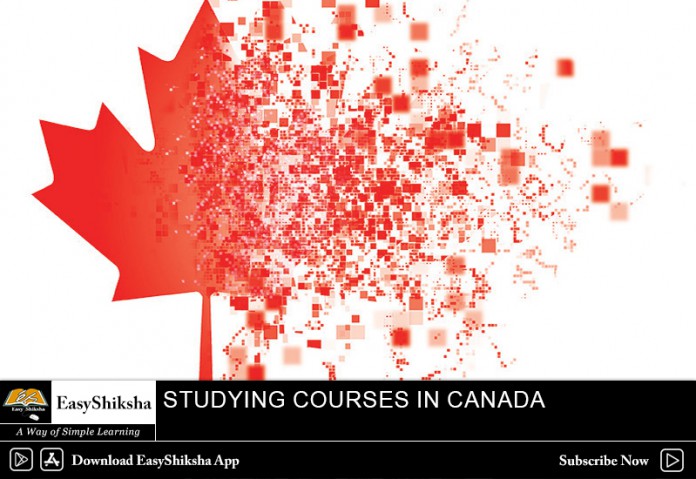Choosing a foreign country for education attracts millions of students. The opportunity of studying abroad is preferred because it provides exciting learning opportunities and broadens horizons Courses in Canada.
Every student wants the best future. Therefore, out of many choices students have, large numbers of them choose Canada for their higher education. As an inviting and all-embracing nation, Canada has the highest rate of college acceptance, though after a lengthy documentation process. The Canadian government has provided all the necessary list of documentation and procedures for filing student visa so you can easily analyze your eligibility criteria. Also, there are some other things to do.

Important Announcement – EasyShiksha has now started Online Internship Program “Ab India Sikhega Ghar Se”

1. Get a Study Permit
After you follow the procedure that is provided on the Canadian citizenship website, you will be allowed to study permit. This is the first and the foremost step and takes time so you should begin as soon as you make up your mind. Your permit will be issued to you by CIC (Citizenship and Immigration Canada) that will enable you to study at the designated academic institute that suits your criteria. The website comprises a list of territory or provincially approved DLI or Designated Learning Institutions where international students can take admissions. Once you are selected by one of the designated institutes, you will get your permit. Though your study permit does not make you eligible for entering Canada, you need to apply for temporary citizenship so you can pursue your education. There are fast pace options (SDS) available for students from certain countries, such as the Philippines, India, China, and Vietnam. Detailed information can be found on several online portals like Students advice, Canada Study permit and Essay writers in Toronto that will guide you about the procedure, eligibility, and other additional details to help you file error free application and smooth execution. Choose your guide wisely, so you can finish the process quickly and in the first attempt.
Top Software Engineering Courses
The validity of the study permit is only as long as your study term, but you get an extra 90 days in case you want to apply for an extension for any reason. If somehow you are unable to complete your term within the given time, then you should apply for extra time or extension period that allows you to finish your course.
Also, you should know that the acceptance rate is comparatively high in Canadian Universities as the eligibility criteria are reasonable, and most universities have easy entry process. Some of the courses even have the requirement of a high school diploma.
2. Get yourself some warm clothing
After getting your student visa, the next advice is to prepare for the country that has warm people but cold weather. The temperatures often reach extreme cold, especially for students who are traveling from warm countries like India. It is advised to keep money and buy warm jackets only when you reach Canada because warmer countries may not have clothing that is prepared for such cold weather. Also, it is wise to learn a little about snow, its types and how to deal with emergencies but do not over think this part. As once you reach there, you will make plenty of friends to help you deal with things you may not have experienced before.
Empower your team. Lead the industry
Get a subscription to a library of online courses and digital learning tools for your organization with EasyShiksha
Request NowDespite the long winters, Canadian cities like Toronto, Vancouver, and Montreal Universities have the best quality of living as rated by QS World University Rankings so you would not mind studying in freezing weather for some time. Additionally, the tuition, accommodation, and commuting is easier and far less expensive as compared to other countries. Also, these cities, along with others, have higher job ratio as the job market is still not saturated like the USA.
3. Learn more than a couple of languages
Studying in Canada provides varied learning opportunities. You will learn about different weather, diverse cultures, and two official languages, namely English and French. The province of Quebec completely operates in French and students taking admission in Quebec institutes will likely be studying in French; therefore, are advised to learn intermediate level French to cope with it. However, in federal institutes and government matters, both languages are used to communicate with the public. Start your lessons as soon as you apply for your visa, so you do not face any difficulty in communicating when you reach your destination.
4. You can get a scholarship
Despite of affordable education in Canadian education institutes, several scholarship offers are available for deserving students. The University of Toronto offers scholarship namely ‘Lester B. Pearson International Scholarship Program’ which covers tuition and incidental fees, accommodation for entire program duration, and your course material and books. This is a dream scholarship for students with high intellect, so if you have performed well previously in your college, you may look forward to this one.
Another scholarship is awarded by Humber College in Toronto, Ontario. The scholarship is given in January and September to international students and grants either full or partial tuition.
Next is York University that has an International Student Scholarship Program to facilitate outstanding students so they can pursue their education in a foreign land. The scholarship grant ranges from $60,000 – $100,000 for a complete program (usually four years).
British Columbia University also offers international students generous scholarships. The University has dedicated a sum of up to $10M CAD per year to award deserving students from around the world.
5. You can work while studying
Studying in a foreign country can cost you quite a fortune, especially if you have not scored a scholarship. Though tuition is relatively low in Canada as compared to other nations still accommodation, commuting, and buying course books can cost you. But luckily you are in an all-embracing land that allows you to work off campus both part-time and full-time to bear your expenses. You can work as much as 20 hours each week part-time during your course study, though some courses require students not to work more than ten hours due to the complexity of the subject. However, during semester breaks, you are allowed to full-time. It is highly advised and recommended to work during semester breaks because it not only helps you lessen your financial burden, but it also enables you to have relevant field experience which comes in handy while looking for a job.
You should take note of these five pieces of advice before you start studying your courses in Canada.
For information related to technology, visit HawksCode and EasyShiksha
ALSO READ: schools-need-ventilation-for-better-health-and-student-learning
Get Course: TJ-Walkers-Hour-Public-Speaking-Presentation-Skills-Class










































































